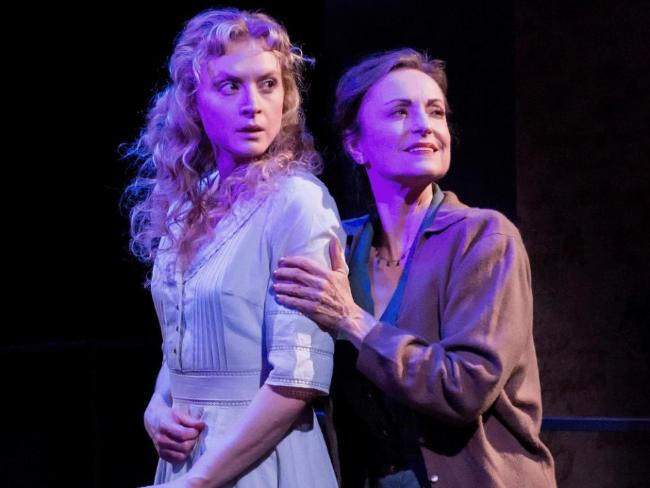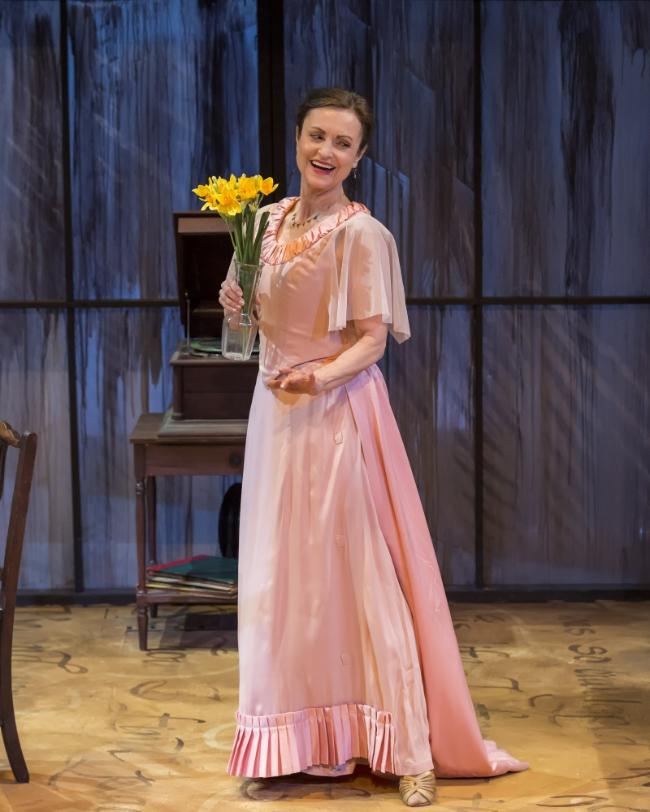5-25-25
The Glass Menagerie at the Antaeus: Looking at the Light
By Diane Sippl

Williams’s œuvre is a hothouse; strange flowers often bloom there.
Helen Shaw
Everything in his life is in his plays, and everything in his plays is in his life.
Elia Kazan
The scene is memory and is therefore non-realistic. Memory takes a lot of poetic license. It omits some details; others are exaggerated, according to the emotional value of the articles it touches, for memory is seated predominantly in the heart. The interior is therefore rather dim and poetic.
Tennessee Williams
Two months ago, in Helen Shaw’s critique for The New Yorker of London’s West End production of A Streetcar Named Desire at presented at BAM, she deplored the use of an on-stage drummer playing an “ear-shattering score” and a set design resembling an elevated boxing ring that doubled as a stage for “mood ballets” by the ensemble, such as a dream-dance slo-mo scrum when Stanley attacks Blanche. Presumably these expressionistic “interventions”—as Shaw refers to them—were meant to “externalize subtext and mental states.”
What is on tap at the Antaeus Theatre Company’s production of A Glass Menagerie in Glendale is quite the opposite: a quiet, tender, intimate production in which words do the talking. Sound strange? “I don’t want realism,” Tennessee Williams often said, “I want magic.” But that magic was his fountain of language, even to the point where his elaborate designations of stage and set designs, his clear and specific directives for lighting and music, were as poetic as his dialogue. There is a cadence to Williams’ words, a rhythm and flow to the speech and the movements of his characters. It lets us experience their inner truths, to see right through their illusions, and most important, to care for them, as he did. A mere four actors on the Antaeus stage bring us a family all too familiar—a nagging mother, a “wayward” son, a painfully shy daughter, and an outside visitor who brings a touch of reality through the door. For, you see, again, like many of us, these people live in a bubble, a bit detached from what all of us deem “normal”—until we look around and wonder what that word means.

Maybe Williams didn’t spend too much time looking elsewhere, because he already had an earful—all he could handle in returning, over and over again, to his own family; so he called his first staged full-length work a “memory play,” because he wanted to share with us the value of memory. He loved the last line of one of Carson McCullers’ poems: “Time, the endless idiot, runs screaming ‘round the world.” From her words, he theorized the essence of dramatic art:
It is this continual rush of time, so violent that it appears to be screaming, that deprives our actual lives of so much dignity and meaning, and it is, perhaps, more than anything else, the arrest of time which has taken place in a completed work of art that gives to certain plays their feeling of depth and significance.
Williams’ father was a boisterous extrovert and a heavy drinker, prone to fits of violence, physical fights, and torment of his young son Thomas (later “Tennessee”) who, after a serious illness, was rather weak and was taunted as “a sissy” by his father, who ultimately did abandon his wife and three children after years of intermittent absence as a traveling shoe salesman. Williams’ mother, a Mississippi clergyman’s daughter raised with southern gentility, was frequently ill, and his sister Rose was actually diagnosed with schizophrenia as a young woman. By the age of 24 her mother, Edwina, authorized a prefrontal lobotomy for Rose, which meant that she would be living in mental institutions for most of her long life. She was Thomas’ best friend through their childhood and youth, and the lobotomy agonized him forever more, as evidenced in his plays Suddenly Last Summer and A Streetcar Named Desire, which more directly dramatize Rose after Williams introduced her as a character named Laura –“Blue Roses”—in The Glass Menagerie.

His first play about her is really his third iteration of Tom Wingfield’s account of his sister. Tom appears as a first-person narrator in “Portrait of a Girl in Glass,” an early short story Tennessee Williams wrote between 1941 and 1943, when his sister Rose was lobotomized. The second version was a screenplay, The Gentleman Caller, written when Williams was living in Santa Monica in 1943, and it was rejected by MGM Studios. From this vision of his story as a film, he wrote the play, The Glass Menagerie, produced on Broadway in 1944 and awarded as the season’s best by the N.Y. Drama Critics Circle. The success launched Tennessee Williams as a playwright, but by 1947 on the third anniversary of the play’s opening in Chicago, Williams wrote in The New York Times of that “Success” as a catastrophe:
Security is a kind of death, I think, and it can come to you in a storm of royalty checks beside a kidney-shaped pool in Beverly Hills or anywhere at all that is removed from the conditions that made you an artist, if that’s what you are or were or intended to be. Ask anyone who has experienced the kind of success that I am talking about—What good is it? Perhaps to get an honest answer you will have to give him a shot of truth-serum but the word he will finally groan is unprintable in genteel publications.
Then what is good? The obsessive interest in human affairs, plus a certain amount of compassion and moral conviction, that first made the experience of living something that must be translated into pigment or music or bodily movement or poetry or prose or anything that’s dynamic and expressive—that’s what’s good for you if you’re at all serious in your aims.
A prolific playwright, Williams was equally prodigious as a short story writer and screenwriter. He himself was the “poet who worked in a shoe warehouse.” How fitting it is, then, that his “memory play” be presented visually with a set that features walls and floors of his own shadowy cursive handwriting. Beyond the domestic relations of his family that he saw as the tragic downfall of his life (and his sister’s), atmosphere and language are key to all of Williams’ plays, an approach he firmly established with The Glass Menagerie. There is nothing clever or surprising or even so original about the plot of this play: in terms of action, not so much happens. Words are what matter, as in all good drama. Theatre, after all, is a spoken art, and Williams gets the poetry right. His lines carry the conflict, the characters, the crucible of memory that is his heart.
And what drives those words? At the emotional core of his characters—all of them—are fear and evasion: “the two little beasts that chase each other’s tails in the revolving wire cage of our nervous world.” Amanda’s fear that Tom will leave her, alone with Laura, with herself, and with her own evasion of the fact that she alone pushes him out the door; Tom’s fear that his lust for life, his spirit of adventure and discovery, in body and mind, will atrophy or vanish, and yet he evades the festering wound his father left him and the need to recoup his family’s loss, to somehow protect Laura while supporting his mother. Laura and Jim, the Gentleman Caller, somewhat mirror each other: his very instruction for her in addressing what he calls a mere “inferiority complex” allows him to exercise precisely the instruction he has undertaken for his own future career, and yet, as she gains confidence by confiding in him, as she discovers she’s even able to “dance,” his shame and guilt peel him away from her arms and they’re both left at odds with each other and with themselves.
So then what is the “magic” in Williams’ theatre, and what is its source? Could it be that we become the magicians? In the dramatic clashing of wills that he creates, the juxtaposition of desires, he allows us to choose, quite consciously, certain moral values by which to live, as if we, too, were characters facing the onslaught of time. He tells us, “Snatching the eternal out of the desperately fleeting is the great magic trick of human existence.” As spectators in the theatre, we have the vantage point to do this.
“Inherit the Play” wrote Helen Shaw in The New Yorker as she rejected the West End production of Williams’ Streetcar Named Desire at BAM. She wouldn’t need to warn Antaeus of her maxim. Not a word is changed in this production of A Glass Menagerie. So what do we gain by fidelity to the prolific American bard’s writing? Superficially, the nagging dialogue between Amanda and Tom may at first feel repetitious, but soon enough Amanda’s litany of language (sit right, eat right, “rise and shine”) allows nuances rather than redundancies; it gives way to a robust surge of sarcasm in Tom no doubt echoing the demeanor of the man (his disappeared father) whose portrait hangs on the living room wall in his absence; it evokes Amanda’s hollow reverie of endless gentlemen callers in one given day, with jonquils ‘til kingdom come coloring her cascading tales; in turn, all this invites layers of contemplation and revised views of characters, situations—some fade, others seep in (what, finally, is meant by “at the movies”?).
At Antaeus, Josh Odsess-Rubin, who plays Tom, bears a haunting visage of Tennessee Williams himself, and his acting is utterly natural and convincing. Gigi Bermingham as Amanda delivers a Southern charm that kills, her accent in full command and even humorous as she wangles magazine subscriptions out of victims on the other end of the phone line. Emily Goss is luminous as Laura—even more than her glass menagerie—though both feel as though lit from within. Alex Barlas is delightful as Jim O’Connor, almost comic relief if it weren’t for his own moments of poignant self-reflection. John Ballinger’s music and Karyn Lawrence’s lighting are to-the-letter in following Williams’ prescriptions, as are the scenic design by Angela Balogh Calin and costumes by Beryl Brachman. This is the play Williams wrote, and the Antaeus Company makes it plain as day that he knew what he was doing. Above all, so does director Carolyn Ratteray. Every bit as much as Tennessee Williams, she "inherits the play."